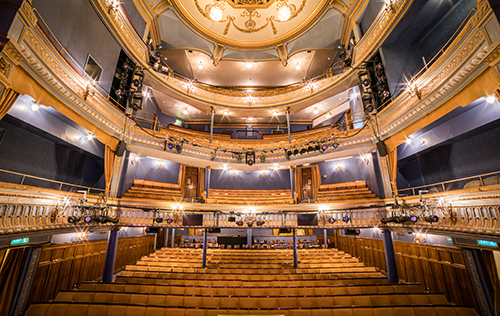Harold Pinter Theatre
Located in Westminster, the Harold Pinter Theatre is famous for its immense history, luxury horseshoe-shaped balconies and of course, for its intimate shows. The theatre is extremely rich with history and is better known as the Comedy Theatre, which the venue was called for over 100 years.

The History of Harold Pinter Theatre
Thomas Verity was the theatre’s original architect and would oversee the construction of this Grade II listed theatre. The theatre would first open its doors in 1881. During this time, there was a full seating capacity of 1,180 people. Now, the seating capacity allows for 796 total patrons to be seated at one time.
The Naming History
Built in just six months, the theatre was first called the Royal Comedy Theatre. This name would be short lived as the venue quickly dropped Royal from the name in 1884. Its new name would remain for well over 100 years before being changed to The Harold Pinter Theatre on October 13, 2011.
The theatre’s current owners, the Ambassador Theatre Group, stated that the name change is in remembrance of Harold Pinter, one of the world’s biggest dramatists.
1883
The theatre quickly rose to fame and hosted Falka’s London premiere.
1885
Erminie would follow in 1885 with its premiere.
WWI
From 1885 all the way through World War I, the theatre was one of the most influential of its kind. Hosting Charles Blake Cochran, the theatre was well known for revue shows at the time.
Major Reconstruction
For a brief period in time, the theatre was completely shut down for a major renovation. This renovation would occur in the mid-1950s. Reopening in December of 1955, the theatre changed forever, but the auditorium remained virtually unchanged. This has allowed the theatre to be a timeless classic amongst visitors and would still be recognized by Verity due to the famous, three-tier balconies that are seen.
Overthrowing an Old Act
Set in 1843, the Theatres Act required all scripts to first be approved before being presented on the big stage. This archaic act forced many scripts to be turned away and the theatre played a big role in the change of the Act in 1956.
During this time, the New Watergate Club would open and would allow plays to be accepted under specific conditions. This allowed many plays that were otherwise banned to take place. This was a major turning point in theatre history.
Current State of Affairs
Harold Pinter Theatre provides four levels of seating. The seating levels are as follows:
- Balcony
- Royal Circle
- Dress Circle
- Stalls
The stalls are closest to the stage, but the Balcony seating still provides exceptional views with ease of visibility at all times. Prices range from £10 – £85 for premium seats. A general rule of thumb for the following pricing tiers is seen:
- £10 – 25: All balcony seats, seats 6 and 15 in the dress circle due to viewing issues and sparse seats in the stall section that also have obstruction of views.
- £30 – 40: Meant for dress circle and royal circle seating with few stall seating options available. This price range may include lower seats that have minor viewing obstruction.
- £54: Meant for stall and dress circle seats that have little to no visibility issues. These are often some of the best seats in the house aside from the next tier mentioned.
- £85: Center seats in the stall section with completely unobstructed views of the stage. Very few seats are available at this price range.
Facilities
The facilities contain air conditioning, a cloakroom and a shop. There is ample toilets seen with handicap accessible stalls offered as well. Staff is always willing to assist handicap patrons with anything that is needed.
There are 3 bars seen that offer water, spirits, wine and soft drinks. The bars are conveniently located in the Foyer, Stalls and Royal Circle levels.
A basic shop that offers sparse food items and an array of merchandise that can be purchased.
Directions to the Theatre
The theatre is located on Panton Street in London. There are a variety of ways to get to the venue, including:
Bus
By far the easiest method. Buses 14, 19, 24, 29 and 38 as well as bus 176 will take guests directly to Leicester Square.
By Car
The easiest, most direct route by auto would be to take A4 past Fortnum & Mason directly to the theatre, which will be on the right.
Car parks are readily available in the area and are all within a short walking distance of the theatre.
Sunny Afternoon is currently playing at the theatre and will be playing all the way into January of 2015. The theatre has not yet released future shows that will be added. Guests can purchase tickets online or at the door. Tickets to any showing at the theatre can alternatively be purchased at ATG Tickets.
You can find the address here, get contact details here and take a look at the seating plan here.